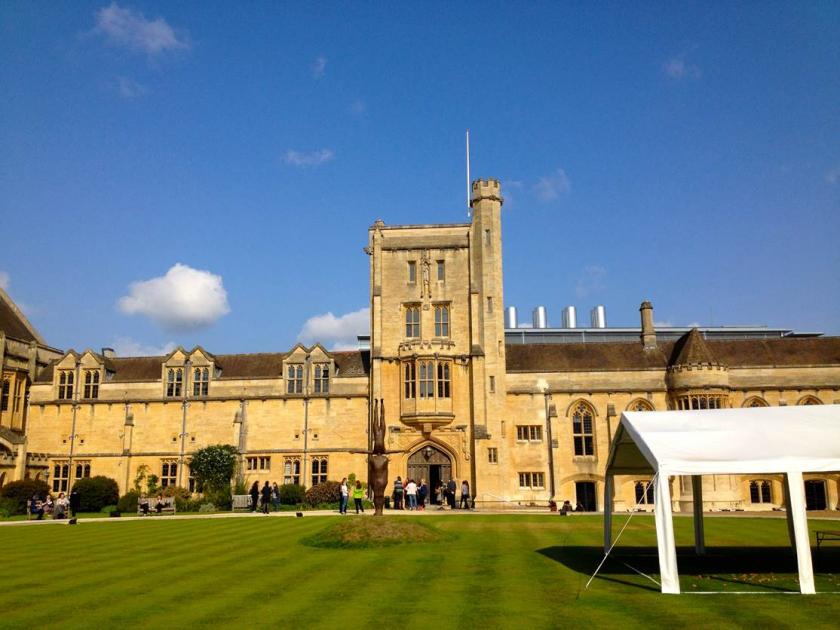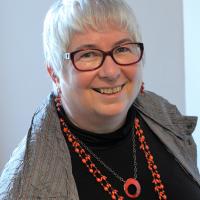
Associate Professor Lori Kendall, Associate Professor Jerome McDonough, and doctoral candidate Rhiannon Bettivia presented their research recently at the Digital Memories 5th Global Conference, held at Mansfield College, Oxford University, at the end of September.
Kendall presented the paper, “Personal Archiving and Digital Memories,” in which she explores the use of the term “archiving” as it is applied to the personal collection and preservation of family documents, photos, blogs, and other items.
From the abstract: When we call what people do when they create, accumulate, organise, and preserve these items archiving, we impose a view of the world derived from archival theory onto practices that do not fit that theory. Our intentions in doing so are good; we seek to assist people in the problems they have with organisation and preservation. However, the metaphor of the archive tends to get in the way of this goal. In making this critique I discuss some of the difficulties facing people when they attempt to get control of their digital (and non-digital) personal materials, drawing on a case study of a collection of family documents, the experiences of students working on final projects for my Personal Archiving class, and reports from the United States Library of Congress’s Personal Archiving outreach programs.
Kendall is the president of the Association of Internet Researchers and conducts research in the areas of personal archiving, social aspects of computing, and online community and identity.
McDonough presented the paper, “Failure to Connect: Institutional Impediments to the Preservation of Virtual Worlds.” Informed by his research in the Preserving Virtual Worlds projects, McDonough notes that while research into the preservation of digital materials has increased, preservation of software-based works still represents a major challenge.
From the abstract: There are a number of reasons why the preservation of complex, interactive digital works remains such a problem at the moment, including media and platform dependencies and issues of costs around acquisition, storage and description of these works. I believe there is a more fundamental problem at play in the preservation of complex digital cultural heritage materials, however, and that is existing institutional arrangements for digital preservation do not adequately support the social and inter-institutional cooperation which must exist to preserve complex digital media. Drawing upon research conducted in the Preserving Virtual Worlds projects, this paper uses examples of virtual worlds such as Warcraft III and Second Life to highlight some of the technical requirements for digital preservation of complex works, and to demonstrate how existing social and institutional arrangements tend to work against these works’ long-term preservation.
McDonough’s research focuses on socio-technical aspects of digital libraries, with a particular focus on issues of metadata and description as well as digital preservation of complex media and software. He has served as head of the Digital Library Development Team for New York University and also has been an active participant in metadata standards activities for digital libraries: he previously served as chair of the METS Editorial Board as well as a member of the NISO Standards Development Committee and the ODRL International Advisory Board.
Doctoral candidate Rhiannon Bettivia presented, “Seeing the Unseen: The Politics and Privileges of Invisibility and Opacity in the Digital Archive.” By looking at a selection of digital archives, Bettivia investigates how privilege plays into the construction of an archive.
From the abstract: Without dismissing traditional archives as a tightly constructed body of record, our notion of what archives are and what they do must expand as the kind of content that goes into them moves beyond easily qualified records into digital spaces where objects are often fluid and boundless … Who speaks for these bodies in digital spaces and how do projects of archives negotiate power structures that render some things purposefully hidden while forcibly unhiding others? As we develop new archival practice to cope with digital memory, we can begin to address issues of power as expressed through, replicated in and reified via what is included in an official record.
Bettivia’s research in digital preservation focuses on film, digital, and transmediated games and time-based media art. While at GSLIS, she has been associated with the Preserving Virtual Worlds II and Learning to See Systems grant projects. She is currently working on her doctoral thesis, which takes a critical social look at the Open Archival Information System (OAIS) reference model. Prior to coming to GSLIS, she was a student in the Moving Image Archiving and Preservation program at New York University.
